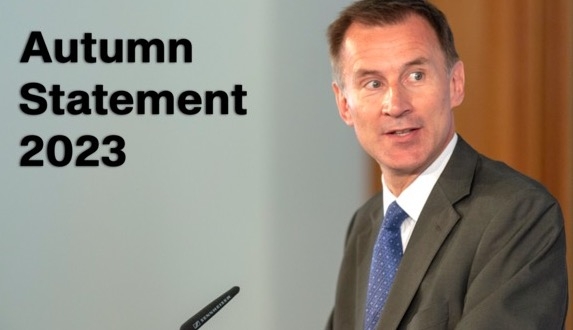Chancellor Jeremy Hunt has announced that the Government will abolish the “Class 2” National Insurance charge for self-employed people earning over £12,570 a year.
Currently there is a flat rate compulsory charge of £3.45 a week paid by 29m working people and worth £9bn a year.
The Chancellor said the measure announced in today’s Autumn Statement would save the average self-employed worker £192 a year.
He also announced that self-employed people who pay “Class 4” National Insurance at 9% on earnings between £12,750 and £50,270 will see the rate they pay cut from 9% to 8% from April.
Those with profits between £6,725 and £12,570 will continue to get access to contributory benefits including the State Pension through a National Insurance credit without paying NICs, as they do currently.
Those with profits under £6,725 and others who pay Class 2 NICs voluntarily to get access to contributory benefits including the State Pension, will continue to be able to do so. The weekly rate they pay will be frozen at £3.45 for 2024-25, rather than rising by CPI to £3.70.
The Small Profits Threshold (the point at which the self-employed start to receive National Insurance credits) has been frozen at £6,725, in line with last year. This supports low income working individuals by maintaining their access to contributory benefits, without having to pay NICs.
He said: “Taken together with the abolition of the compulsory Class 2 charge, these reforms will save around two million self-employed people an average of £450 a year from April.”
Sarah Coles, head of personal finance, Hargreaves Lansdown said tax bills will continue to rise for the self-employed despite today’s cuts to NI.
She said: “Self-employed people have lower average earnings than those who are employed, so this is a welcome respite from one of the many pressures which risk pushing many of them under.
“However, this does nothing to protect those hard-working self-starters from the horrors of fiscal drag, which means tax bills will continue to rise for years to come.
“It was perhaps what we could always expect from a Statement with an over-riding priority to keep a lid on inflation.”
The main employee National Insurance rate will also be cut by 2% from 12% to 10% from 6 January.
The Government said the cut would lower the combined basic rate of tax to 30% (income tax plus national insurance), the lowest since the 1980s.
According to the Government factsheet on today’s changes, for those on average salaries, personal taxes would be lower in the UK than every other G7 country, based on the most recent OECD data.
Steven Cameron, pensions director at Aegon, said he would rather have seen a cut to income tax rates as the cuts to NICs could put the State Pension under strain.
He said: “Chancellor Jeremy Hunt's decision to cut National Insurance (NI) contributions will be welcomed by both employees and the self-employed. But doing this, rather than cut income tax rates, carries significant implications for both individuals and the state pension system.
“While the NI cuts directly benefits employees and the self-employed, unlike a cut in income tax rates it won’t benefit those over state pension age (currently 66), who are exempt from NI contributions.
“But NI cuts have the benefit of applying automatically across all of the UK, ensuring equal benefits for all regions such as Scotland. This is in contrast to cutting income tax, which is subject to devolved powers, so for example, would not have applied in Scotland unless the Scottish Government had followed suit.
“Furthermore, National Insurance contributions provide funding for essential benefits, including the state pension. Although this reduction in contributions will be welcomed by many, it could further strain the sustainability of the state pension due to an aging population and the triple lock mechanism leading to substantial pension increases. Without additional funding from general taxation, the affordability of the state pension may become increasingly challenging.
"Finally, a cut in income tax rates would have led to lower pensions tax relief, whereas cutting NI rates does not reduce the generosity of pensions tax relief.”

